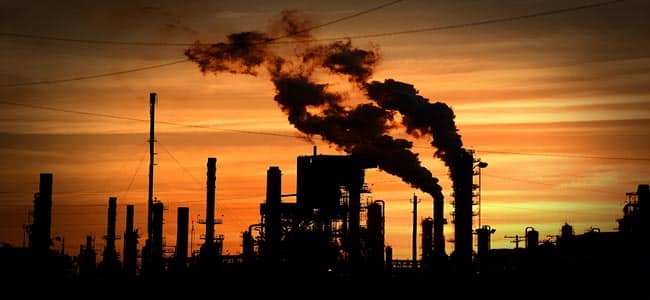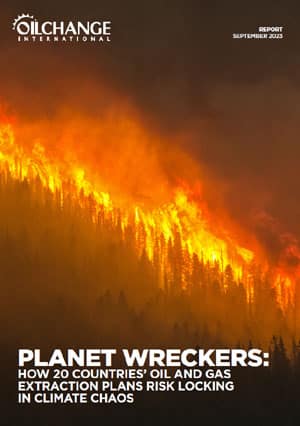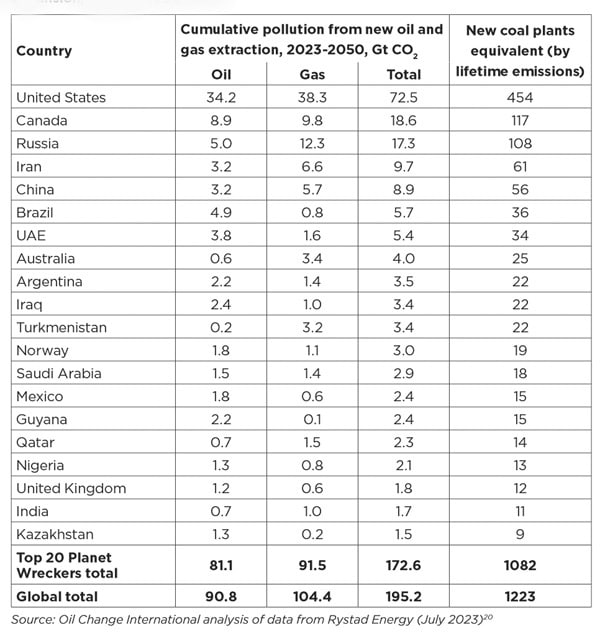
 Just 20 countries, led overwhelmingly by the United States, Canada and Russia, are responsible for nearly 90 percent of new greenhouse gas emissions threatened by new oil and gas fields and fracking wells planned between now and 2050. If these extraction projects are allowed to proceed, they will lock in climate chaos and an unlivable future.
Just 20 countries, led overwhelmingly by the United States, Canada and Russia, are responsible for nearly 90 percent of new greenhouse gas emissions threatened by new oil and gas fields and fracking wells planned between now and 2050. If these extraction projects are allowed to proceed, they will lock in climate chaos and an unlivable future.
According to Planet Wreckers, a report released this week by the research and advocacy organization Oil Change International:
- Only 20 Planet Wrecker countries are responsible for nearly 90 percent of the carbon-dioxide (CO2) pollution from new oil and gas fields and fracking wells planned between 2023 and 2050.
- If these 20 Planet Wreckers said “no” to their planned new oil and gas production, as the UN Secretary General is urging them to, 173 billion tonnes (Gt) of carbon pollution would be kept in the ground. That is equivalent to the lifetime pollution of nearly 1,100 new coal plants, or more than 30 years of annual U.S. carbon emissions.
- Oil and gas expansion by the 20 Planet Wrecker countries would make it impossible to hold temperature rise to 1.5°C. Even extracting just the fossil fuels from existing sites globally would result in 140 percent more carbon pollution than the allowed budget for 1.5°C. If these countries proceed with their new extraction, committed carbon pollution will be 190 percent over the 1.5°C budget, risking locking in more than a dangerous 2°C of warming.
- Stopping new oil and gas would put the world closer to a 1.5°C aligned emissions trajectory but would not be enough. Without any new oil and gas fields or licenses anywhere, global oil and gas production would decline by two percent per year to 2030 and by five percent per year from 2030 to 2050. However, limiting heating to 1.5°C requires governments to go further by closing down already producing fields.
- The United States is Planet Wrecker In Chief, accounting for more than one-third of planned global oil and gas expansion through 2050, followed by Canada and Russia. The United Arab Emirates (UAE) is also set to be one of the largest expanders of oil and gas production despite pledging to use its COP presidency to “keep 1.5°C alive.”
- Five global north countries with the greatest economic means to rapidly phase out production are responsible for a majority (51 percent) of planned expansion from new oil and gas fields through 2050: the United States, Canada, Australia, Norway, and the United Kingdom. New drilling in countries with high incomes, diversified economies and outsized historical responsibility for causing the climate crisis, while claiming to be climate leaders, is inexcusable. These countries must not only stop expansion immediately but also move first and fastest to phase out their production and pay their fair share to fund a just global energy transition.
As Romain Ioualalen, co-author of the report, says: “It’s simple: when you are in a hole, the first step is to stop digging. The climate crisis is global in nature – but is atrociously unjust. A handful of the world’s richest nations are risking our future by ignoring the calls to rapidly phase out fossil fuels. Despite very clear science telling us what is in store beyond 1.5°C, these so-called climate leaders are planning for climate chaos. Continuing to increase fossil fuel production anywhere is not compatible with a liveable future.
Julia Levin, Associate Director of Environmental Defence Canada, adds: “Canada has been rightly exposed as one of the worst polluters on the planet, as a result of its plans to increase oil and gas production. It has been a devastating summer for people across Canada, who have lost their lives, their homes and their communities as a result of climate disasters. Yet governments in Canada are throwing fuel on the fire by expanding oil and gas production, while the federal government drags its feet on new rules that would cap and cut emissions from the oil and gas sector. Further delay in reducing oil and gas pollution is inexcusable.”



